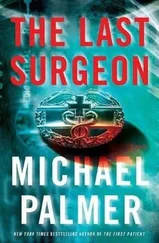Michael Palmer - The Society
Здесь есть возможность читать онлайн «Michael Palmer - The Society» весь текст электронной книги совершенно бесплатно (целиком полную версию без сокращений). В некоторых случаях можно слушать аудио, скачать через торрент в формате fb2 и присутствует краткое содержание. Жанр: Триллер, на английском языке. Описание произведения, (предисловие) а так же отзывы посетителей доступны на портале библиотеки ЛибКат.
- Название:The Society
- Автор:
- Жанр:
- Год:неизвестен
- ISBN:нет данных
- Рейтинг книги:5 / 5. Голосов: 1
-
Избранное:Добавить в избранное
- Отзывы:
-
Ваша оценка:
- 100
- 1
- 2
- 3
- 4
- 5
The Society: краткое содержание, описание и аннотация
Предлагаем к чтению аннотацию, описание, краткое содержание или предисловие (зависит от того, что написал сам автор книги «The Society»). Если вы не нашли необходимую информацию о книге — напишите в комментариях, мы постараемся отыскать её.
The Society — читать онлайн бесплатно полную книгу (весь текст) целиком
Ниже представлен текст книги, разбитый по страницам. Система сохранения места последней прочитанной страницы, позволяет с удобством читать онлайн бесплатно книгу «The Society», без необходимости каждый раз заново искать на чём Вы остановились. Поставьте закладку, и сможете в любой момент перейти на страницу, на которой закончили чтение.
Интервал:
Закладка:
The reading of the roll, consisting of as many as twenty names each month, was, as always, painful. Along with most of the names was a short statement of the reasons this fifty-one-year-old family practitioner or that forty-eight-year-old obstetrician decided to look elsewhere for the emotionally fulfilling, economically rewarding life that they at one time felt was worth the years of sacrifice, exhaustion, and escalating financial outlay demanded by medical school and residency.
This month, three of the nine names on the roll were well known to Will. One of them had been a clinical instructor of his in med school. Half of all physicians recently polled , he was thinking glumly and angrily, had said that given the chance, they would not do it over. .
After the reading of the roll, Lemm called on the Society’s legal committee, which reviewed in detail the status of a class-action suit being brought against several of the largest HMOs by the Hippocrates Society in conjunction with a number of state medical associations and some individual physicians. The case, which had been plodding forward for almost five years but was now gaining some momentum, charged the HMOs with extortion and with violating the federal Racketeer Influenced and Corrupt Organizations Act.
Other legal actions from around the country were also reviewed, including a lawsuit in California accusing the health plans of interfering with physicians’ ability to make independent medical decisions. The plans threatened physicians with economic loss, the suit was charging, in an effort to deter them from fulfilling their duty owed their patients and encourage them to place unreasonable and often unsafe restrictions on the level of medical services that might be delivered to their patients.
The legal team’s presentation was interrupted a number of times by applause. In the analogies to the Nazi takeover of Europe, the lawyers and physicians of the legal team were the resistance-sniping at the enemy, disrupting them wherever possible. When they had finished their presentation, there was an almost palpable drop in energy throughout the hall.
“So,” Lemm announced, perhaps sensing the same thing, “before we do new business, let’s hear from our illustrious publicity and public relations chairman, Will Grant. What do you have for us tonight, Will?”
There was a smattering of applause as Will took over the microphone. He had been painfully shy as a child, and as an adult had never been that comfortable speaking in public. But over time he had managed to convince himself that looking or sounding like a fool wasn’t that big a deal. After two years, reporting to the Society each month held no great stress-especially when he had material such as he did tonight.
“Before I present a couple of cases,” he began, “I want to say that advance ticket sales for our forum with Boyd Halliday of Excelsius Health are brisk, and we already may have sold out Faneuil Hall. When I’m finished, Tom has some announcements to make regarding that event, which is going to be held despite the recent managed-care murders.
“As many of you know, my writing is about as dynamic as a snail derby. Thankfully, our committee has Randy Harrington, who continues regularly to submit wonderful letters to the editor and op-ed pieces to both papers as well as some suburban publications. This past month two of them have been published, one in the Globe. I hope you’ve had the chance to read them. If not, they are on our web site. Randy, could you take a bow?”
Harrington, a slightly built pediatrician with a pediatrician’s penchant for colorful bow ties, did as he was asked.
“Will Grant is a much better writer than he would have any of us believe,” Harrington said after the applause had quieted, “especially for a surgeon.”
“Roughly translated,” Will replied, “that means I know several words with more than one syllable and own at least five books that don’t require crayons.”
Tom Lemm laughed loudest of all.
“So,” Will went on, “as you know, your crack publicity and public relations committee members are constantly casting about for stories we might submit to the papers or at least present to you all. Tonight I have two of them in which our friendly neighborhood HMOs combine medicine and mathematics to give the best possible care to their constituents.
“A Newton psychiatrist writes: I admitted a twelve-year-old boy from orthopedics to our inpatient adolescent unit. He had bilateral ankle fractures sustained after jumping off the peak of the roof of his family’s garage. It was no challenge to diagnose the boy with major depressive illness and to conclude that his leap was a bona fide suicide attempt. I contacted the medical director of his HMO and requested a two-week hospitalization to do intensive family work in an attempt to provide him with a safer home environment, to initiate antidepressant medication, and to monitor his pain meds since one fracture needed to be repaired with an open reduction. I presented the case, including the mental-status exam, which was positive for a profoundly depressed mood, constricted affect, suicidal ideation, substance abuse, feelings of hopelessness and worthlessness, and sleep and appetite disturbances.
“Now, tell me again, the HMO medical gatekeeper asked, how high was the building he jumped off?
“What has that got to do with anything? This kid is hell-bent on killing himself. He needs at least fourteen days in the hospital.
“I’ll ask you again-how high was the garage?
“Two stories, I said. What difference does it make?
“If it really was two stories, he said, I’ll give you two days of initial authorization.
“Two days?!! So if it was three stories I’d get three days?
“Two days is what I can give you. You can call back after that and request approval for more, but I can’t guarantee you’ll get them.
“If this were your son, I’m sure your response would be different, I said. But, then again, he’d probably be dead by now, you Janus-faced bastard.
“The gatekeeper hung up on me. Eventually I got a total of six days for the kid. In the lobby the day he was discharged, I heard his father call him a little jerk. The next day I submitted my resignation from the hospital and started looking for a nonclinical job. Thank you, managed care.”
The ending, tragic though it was, brought sustained applause. The members’ exuberance was born purely of frustration. Every one of them had encountered similar, logic-defying bureaucratic stonewalling of the way they wished to practice medicine.
“You had to have made this up,” someone cried out.
Will shook his head.
“I don’t have that kind of imagination,” he said. “These are real stories from real people. Okay, one more math-and-medicine case, this one a quickie from a surgeon in Worcester. Patient comes to see her with bleeding, horribly painful hemorrhoids. The guy’s done everything his family doc asked him to-soaks, suppositories, stool softeners, rubber donut. Finally, sleepless, in constant pain, bleeding through a pad, and unable to sit at work, he comes in for surgery. The surgeon dutifully calls for the HMO’s preapproval and is stunned to have the young voice on the phone ask how large the hemorrhoids are. Clearly the lad is parroting questions off a computer screen, the surgeon writes. What difference does it make how large or small they are, she asks, THEY’RE KILLING HIM!!! Just say you’ll pay for this man’s care and let me fix him up. Ma’am, I’m afraid I can’t do that, the kid says. I need to know the size of the hemorrhoids before I can approve payment for the surgery. Okay, okay, okay, says the surgeon-on the faculty at the medical school, incidentally-the guy’s hemorrhoids are roughly the size of Nebraska. The lad making medical decisions for his HMO over the phone thinks for a few seconds, fills in the blank on his screen, then approves the procedure.”
Читать дальшеИнтервал:
Закладка:
Похожие книги на «The Society»
Представляем Вашему вниманию похожие книги на «The Society» списком для выбора. Мы отобрали схожую по названию и смыслу литературу в надежде предоставить читателям больше вариантов отыскать новые, интересные, ещё непрочитанные произведения.
Обсуждение, отзывы о книге «The Society» и просто собственные мнения читателей. Оставьте ваши комментарии, напишите, что Вы думаете о произведении, его смысле или главных героях. Укажите что конкретно понравилось, а что нет, и почему Вы так считаете.












